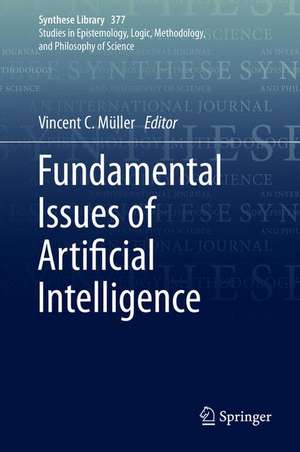Fundamental Issues of Artificial Intelligence: Synthese Library, cartea 376
Editat de Vincent C. Mülleren Limba Engleză Hardback – 15 iun 2016
The key issues this volume investigates include the relation of AI and cognitive science, ethics of AI and robotics, brain emulation and simulation, hybrid systems and cyborgs, intelligence and intelligence testing, interactive systems, multi-agent systems, and super intelligence.
Based on the 2nd conference on “Theory and Philosophy of Artificial Intelligence” held in Oxford, the volume includes prominent researchers within the field from around the world.
| Toate formatele și edițiile | Preț | Express |
|---|---|---|
| Paperback (1) | 1393.72 lei 6-8 săpt. | |
| Springer International Publishing – 30 mai 2018 | 1393.72 lei 6-8 săpt. | |
| Hardback (1) | 1399.87 lei 6-8 săpt. | |
| Springer International Publishing – 15 iun 2016 | 1399.87 lei 6-8 săpt. |
Din seria Synthese Library
- 15%
 Preț: 638.43 lei
Preț: 638.43 lei - 18%
 Preț: 989.98 lei
Preț: 989.98 lei - 15%
 Preț: 596.69 lei
Preț: 596.69 lei - 18%
 Preț: 903.93 lei
Preț: 903.93 lei - 15%
 Preț: 586.88 lei
Preț: 586.88 lei - 15%
 Preț: 696.50 lei
Preț: 696.50 lei - 18%
 Preț: 892.90 lei
Preț: 892.90 lei - 15%
 Preț: 643.34 lei
Preț: 643.34 lei -
 Preț: 282.33 lei
Preț: 282.33 lei - 5%
 Preț: 372.19 lei
Preț: 372.19 lei -
 Preț: 443.10 lei
Preț: 443.10 lei - 15%
 Preț: 637.59 lei
Preț: 637.59 lei - 18%
 Preț: 958.88 lei
Preț: 958.88 lei - 15%
 Preț: 642.36 lei
Preț: 642.36 lei - 18%
 Preț: 1230.66 lei
Preț: 1230.66 lei - 15%
 Preț: 642.83 lei
Preț: 642.83 lei - 18%
 Preț: 1000.39 lei
Preț: 1000.39 lei -
 Preț: 389.70 lei
Preț: 389.70 lei - 15%
 Preț: 637.28 lei
Preț: 637.28 lei - 18%
 Preț: 952.26 lei
Preț: 952.26 lei - 18%
 Preț: 1231.32 lei
Preț: 1231.32 lei - 15%
 Preț: 645.96 lei
Preț: 645.96 lei -
 Preț: 395.85 lei
Preț: 395.85 lei -
 Preț: 400.47 lei
Preț: 400.47 lei - 18%
 Preț: 1225.48 lei
Preț: 1225.48 lei - 15%
 Preț: 638.89 lei
Preț: 638.89 lei - 18%
 Preț: 1232.09 lei
Preț: 1232.09 lei -
 Preț: 380.45 lei
Preț: 380.45 lei -
 Preț: 394.87 lei
Preț: 394.87 lei - 15%
 Preț: 640.37 lei
Preț: 640.37 lei - 15%
 Preț: 639.08 lei
Preț: 639.08 lei -
 Preț: 381.98 lei
Preț: 381.98 lei - 15%
 Preț: 643.00 lei
Preț: 643.00 lei - 15%
 Preț: 672.29 lei
Preț: 672.29 lei
Preț: 1399.87 lei
Preț vechi: 1707.16 lei
-18% Nou
Puncte Express: 2100
Preț estimativ în valută:
267.90€ • 290.90$ • 225.03£
267.90€ • 290.90$ • 225.03£
Carte tipărită la comandă
Livrare economică 22 aprilie-06 mai
Preluare comenzi: 021 569.72.76
Specificații
ISBN-13: 9783319264837
ISBN-10: 3319264834
Pagini: 250
Ilustrații: IX, 572 p. 62 illus.
Dimensiuni: 155 x 235 x 37 mm
Greutate: 0.98 kg
Ediția:1st ed. 2016
Editura: Springer International Publishing
Colecția Springer
Seria Synthese Library
Locul publicării:Cham, Switzerland
ISBN-10: 3319264834
Pagini: 250
Ilustrații: IX, 572 p. 62 illus.
Dimensiuni: 155 x 235 x 37 mm
Greutate: 0.98 kg
Ediția:1st ed. 2016
Editura: Springer International Publishing
Colecția Springer
Seria Synthese Library
Locul publicării:Cham, Switzerland
Public țintă
ResearchCuprins
Editorial Note; Vincent C. Müller.- New developments in the philosophy of AI; Vincent C. Müller.- Part 1. Computing.- Rationality and Intelligence: A Brief Update; Stuart J Russell.- Computation and Multiple Realizability; Marcin Miłkowski.- When Thinking Never Comes to a Halt: Using Formal Methods in Making Sure Your AI Gets the Job Done; Tarek Richard Besold and Robert Robere.- Machine Intelligence and the Grammar of Computability; David Leslie.- Is there a Role for Computation in the Enactive paradigm? ; Carlos Eduardo Brito and Victor X. Marques.- Natural Recursion Doesn't Work that Way: Automata in Planning and Syntax; Cem Bozsahin.- Part 2. Information.- AI, Quantum Information, and External Semantic Realism: Searle's Observer-Relativity and Chinese Room, Revisited; Yoshihiro Maruyama.- Semantic Information and Artificial Intelligence; Anderson de Araújo.- Information, Computation, Cognition. Agency-based Hierarchies of Levels; Gordana Dodig Crnkovic.- From Simple Machines toEureka in Four Not-So-Easy Steps. Towards Creative Visuospatial Intelligence; Ana-Maria Olteteanu.- Part 3. Cognition and Reasoning.- Leibniz’s Art of Infallibility, Watson, and the Philosophy, Theory, & Future of AI; Selmer Bringsjord and Naveen Sundar Govindarajulu.- The Computational Theory of Cognition; Gualtiero Piccinini.- Representational Development Need Not Be Explicable-By-Content; Nicholas Shea.- Toward a Theory of Intelligent Complex Systems: From Symbolic AI to Embodied and Evolutionary AI; Klaus Mainzer.- The Anticipatory Brain: Two Approaches; Mark Bickard.- General homeostasis, passive life, and the challenge to autonomy; Stefano Franchi.- Ad Hoc Hypotheses and the Monsters within; Ioannis Votsis.- Arguably argumentative: A formal approach to the argumentative theory of reason; Sjur Kristoffer Dyrkolbotn and Truls Pedersen.- Explaining Everything; David Davenport.- Why Emotions Do Not Solve the Frame Problem; Madeleine Ransom.-
Playing HeX with Aunt Hilary: Games with an anthill; J. Mark Bishop, Slawomir J. Nasuto, Matthew Spencer, Etienne Roesch and Thomas Tanay.- Computer Models of Constitutive Social Practices; Richard Evans.- Part 4. Embodied Cognition.- Artificial Intelligence: The Point of View of Developmental Robotics; Jean-Christophe Baillie.- Tacit Representations and Artificial Intelligence: Hidden Lessons from an Embodied Perspective on Cognition; Elena Spitzer.- Machine art or machine artists?: Dennett, Danto, and the expressive stance; Adam Linson.- Perception, Action & the Notion of Grounding; Alex Tillas and Gottfried Vosgerau.- The Seminal Speculation of a Precursor: Elements of Embodied Cognition and Situated AI in Alan Turing; Massimiliano Cappuccio.- Heideggerian AI and the being of robots; Carlos Herrera and Ricardo Sanz.- Part 5. Ethics.- The need for moral competency in autonomous agent architectures; Matthias Scheutz.- Order Effects, Moral Cognition, and Intelligence; Marcello Guarini and Jordan Benko.- Artificial Intelligence and Responsible Innovation; Miles Brundage.- Future Progress in Artificial Intelligence: A Survey of Expert Opinion; Vincent C Müller and Nick Bostrom.
Playing HeX with Aunt Hilary: Games with an anthill; J. Mark Bishop, Slawomir J. Nasuto, Matthew Spencer, Etienne Roesch and Thomas Tanay.- Computer Models of Constitutive Social Practices; Richard Evans.- Part 4. Embodied Cognition.- Artificial Intelligence: The Point of View of Developmental Robotics; Jean-Christophe Baillie.- Tacit Representations and Artificial Intelligence: Hidden Lessons from an Embodied Perspective on Cognition; Elena Spitzer.- Machine art or machine artists?: Dennett, Danto, and the expressive stance; Adam Linson.- Perception, Action & the Notion of Grounding; Alex Tillas and Gottfried Vosgerau.- The Seminal Speculation of a Precursor: Elements of Embodied Cognition and Situated AI in Alan Turing; Massimiliano Cappuccio.- Heideggerian AI and the being of robots; Carlos Herrera and Ricardo Sanz.- Part 5. Ethics.- The need for moral competency in autonomous agent architectures; Matthias Scheutz.- Order Effects, Moral Cognition, and Intelligence; Marcello Guarini and Jordan Benko.- Artificial Intelligence and Responsible Innovation; Miles Brundage.- Future Progress in Artificial Intelligence: A Survey of Expert Opinion; Vincent C Müller and Nick Bostrom.
Recenzii
“It is a deep study and anyone interested in Alan Turing and AI will find a lot of interesting material. Doctoral candidates can use the book to spin off ideas and think about open issues. The many reference papers can serve as a wealth of information as well. I highly recommend this book for those in academia.” (Naga Narayanaswamy, Computing Reviews, January, 2017)
Notă biografică
Vincent C. Müller's research focuses on the nature and future of computational systems, particularly on the prospects of artificial intelligence. He is the coordinator of the European Network for Cognitive Systems, Robotics and Interaction (2009-2014) with over 800 members. He has organised a number of prominent conferences in the field. Müller has published a number of articles and edited volumes on the philosophy of computing, the philosophy of AI and cognitive science, the philosophy of language, and related areas. He works at Anatolia College/ACT and at the University of Oxford.
Textul de pe ultima copertă
This volume offers a look at the fundamental issues of present and future AI, especially from cognitive science, computer science, neuroscience and philosophy. This work examines the conditions for artificial intelligence, how these relate to the conditions for intelligence in humans and other natural agents, as well as ethical and societal problems that artificial intelligence raises or will raise.
The key issues this volume investigates include the relation of AI and cognitive science, ethics of AI and robotics, brain emulation and simulation, hybrid systems and cyborgs, intelligence and intelligence testing, interactive systems, multi-agent systems, and super intelligence.
Based on the 2nd conference on “Theory and Philosophy of Artificial Intelligence” held in Oxford, the volume includes prominent researchers within the field from around the world.
The key issues this volume investigates include the relation of AI and cognitive science, ethics of AI and robotics, brain emulation and simulation, hybrid systems and cyborgs, intelligence and intelligence testing, interactive systems, multi-agent systems, and super intelligence.
Based on the 2nd conference on “Theory and Philosophy of Artificial Intelligence” held in Oxford, the volume includes prominent researchers within the field from around the world.
Caracteristici
First work to offer a complete overview on the theory and philosophy of artificial intelligence Scrutinizes fundamental issues of present and future AI, especially within cognitive science, computer science, neuroscience and philosophy Investigates key issues such as AI and cognitive science, dynamical systems, ethics of AI and robotics, brain emulation and simulation


















